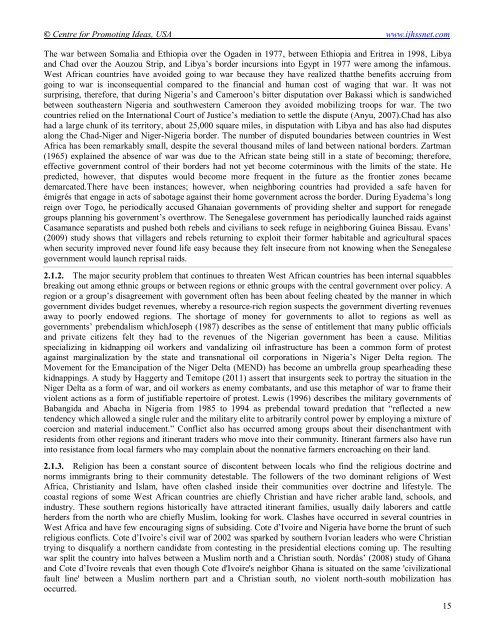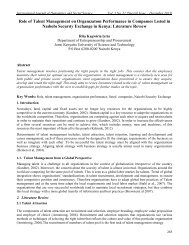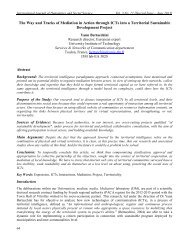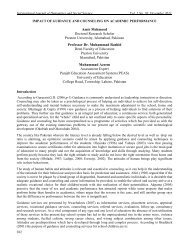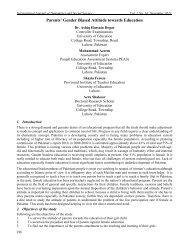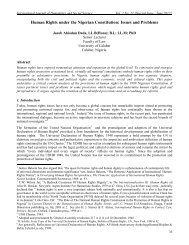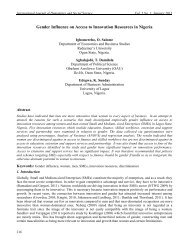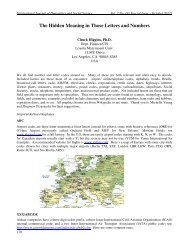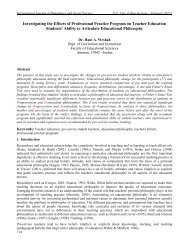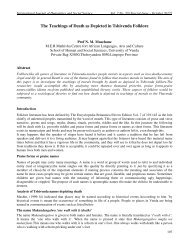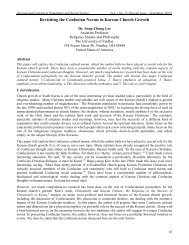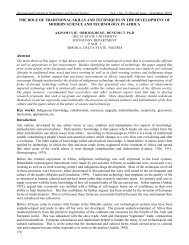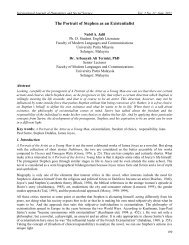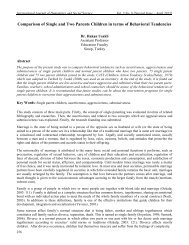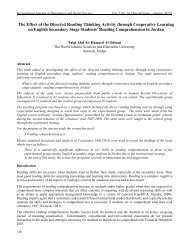The Political and Security Challenges Facing 'ECOWAS' in the ...
The Political and Security Challenges Facing 'ECOWAS' in the ...
The Political and Security Challenges Facing 'ECOWAS' in the ...
You also want an ePaper? Increase the reach of your titles
YUMPU automatically turns print PDFs into web optimized ePapers that Google loves.
© Centre for Promot<strong>in</strong>g Ideas, USA www.ijhssnet.com<br />
<strong>The</strong> war between Somalia <strong>and</strong> Ethiopia over <strong>the</strong> Ogaden <strong>in</strong> 1977, between Ethiopia <strong>and</strong> Eritrea <strong>in</strong> 1998, Libya<br />
<strong>and</strong> Chad over <strong>the</strong> Aouzou Strip, <strong>and</strong> Libya‟s border <strong>in</strong>cursions <strong>in</strong>to Egypt <strong>in</strong> 1977 were among <strong>the</strong> <strong>in</strong>famous.<br />
West African countries have avoided go<strong>in</strong>g to war because <strong>the</strong>y have realized that<strong>the</strong> benefits accru<strong>in</strong>g from<br />
go<strong>in</strong>g to war is <strong>in</strong>consequential compared to <strong>the</strong> f<strong>in</strong>ancial <strong>and</strong> human cost of wag<strong>in</strong>g that war. It was not<br />
surpris<strong>in</strong>g, <strong>the</strong>refore, that dur<strong>in</strong>g Nigeria‟s <strong>and</strong> Cameroon‟s bitter disputation over Bakassi which is s<strong>and</strong>wiched<br />
between sou<strong>the</strong>astern Nigeria <strong>and</strong> southwestern Cameroon <strong>the</strong>y avoided mobiliz<strong>in</strong>g troops for war. <strong>The</strong> two<br />
countries relied on <strong>the</strong> International Court of Justice‟s mediation to settle <strong>the</strong> dispute (Anyu, 2007).Chad has also<br />
had a large chunk of its territory, about 25,000 square miles, <strong>in</strong> disputation with Libya <strong>and</strong> has also had disputes<br />
along <strong>the</strong> Chad-Niger <strong>and</strong> Niger-Nigeria border. <strong>The</strong> number of disputed boundaries between countries <strong>in</strong> West<br />
Africa has been remarkably small, despite <strong>the</strong> several thous<strong>and</strong> miles of l<strong>and</strong> between national borders. Zartman<br />
(1965) expla<strong>in</strong>ed <strong>the</strong> absence of war was due to <strong>the</strong> African state be<strong>in</strong>g still <strong>in</strong> a state of becom<strong>in</strong>g; <strong>the</strong>refore,<br />
effective government control of <strong>the</strong>ir borders had not yet become coterm<strong>in</strong>ous with <strong>the</strong> limits of <strong>the</strong> state. He<br />
predicted, however, that disputes would become more frequent <strong>in</strong> <strong>the</strong> future as <strong>the</strong> frontier zones became<br />
demarcated.<strong>The</strong>re have been <strong>in</strong>stances; however, when neighbor<strong>in</strong>g countries had provided a safe haven for<br />
émigrés that engage <strong>in</strong> acts of sabotage aga<strong>in</strong>st <strong>the</strong>ir home government across <strong>the</strong> border. Dur<strong>in</strong>g Eyadema‟s long<br />
reign over Togo, he periodically accused Ghanaian governments of provid<strong>in</strong>g shelter <strong>and</strong> support for renegade<br />
groups plann<strong>in</strong>g his government‟s overthrow. <strong>The</strong> Senegalese government has periodically launched raids aga<strong>in</strong>st<br />
Casamance separatists <strong>and</strong> pushed both rebels <strong>and</strong> civilians to seek refuge <strong>in</strong> neighbor<strong>in</strong>g Gu<strong>in</strong>ea Bissau. Evans‟<br />
(2009) study shows that villagers <strong>and</strong> rebels return<strong>in</strong>g to exploit <strong>the</strong>ir former habitable <strong>and</strong> agricultural spaces<br />
when security improved never found life easy because <strong>the</strong>y felt <strong>in</strong>secure from not know<strong>in</strong>g when <strong>the</strong> Senegalese<br />
government would launch reprisal raids.<br />
2.1.2. <strong>The</strong> major security problem that cont<strong>in</strong>ues to threaten West African countries has been <strong>in</strong>ternal squabbles<br />
break<strong>in</strong>g out among ethnic groups or between regions or ethnic groups with <strong>the</strong> central government over policy. A<br />
region or a group‟s disagreement with government often has been about feel<strong>in</strong>g cheated by <strong>the</strong> manner <strong>in</strong> which<br />
government divides budget revenues, whereby a resource-rich region suspects <strong>the</strong> government divert<strong>in</strong>g revenues<br />
away to poorly endowed regions. <strong>The</strong> shortage of money for governments to allot to regions as well as<br />
governments‟ prebendalism whichJoseph (1987) describes as <strong>the</strong> sense of entitlement that many public officials<br />
<strong>and</strong> private citizens felt <strong>the</strong>y had to <strong>the</strong> revenues of <strong>the</strong> Nigerian government has been a cause. Militias<br />
specializ<strong>in</strong>g <strong>in</strong> kidnapp<strong>in</strong>g oil workers <strong>and</strong> v<strong>and</strong>aliz<strong>in</strong>g oil <strong>in</strong>frastructure has been a common form of protest<br />
aga<strong>in</strong>st marg<strong>in</strong>alization by <strong>the</strong> state <strong>and</strong> transnational oil corporations <strong>in</strong> Nigeria‟s Niger Delta region. <strong>The</strong><br />
Movement for <strong>the</strong> Emancipation of <strong>the</strong> Niger Delta (MEND) has become an umbrella group spearhead<strong>in</strong>g <strong>the</strong>se<br />
kidnapp<strong>in</strong>gs. A study by Haggerty <strong>and</strong> Temitope (2011) assert that <strong>in</strong>surgents seek to portray <strong>the</strong> situation <strong>in</strong> <strong>the</strong><br />
Niger Delta as a form of war, <strong>and</strong> oil workers as enemy combatants, <strong>and</strong> use this metaphor of war to frame <strong>the</strong>ir<br />
violent actions as a form of justifiable repertoire of protest. Lewis (1996) describes <strong>the</strong> military governments of<br />
Babangida <strong>and</strong> Abacha <strong>in</strong> Nigeria from 1985 to 1994 as prebendal toward predation that “reflected a new<br />
tendency which allowed a s<strong>in</strong>gle ruler <strong>and</strong> <strong>the</strong> military elite to arbitrarily control power by employ<strong>in</strong>g a mixture of<br />
coercion <strong>and</strong> material <strong>in</strong>ducement.” Conflict also has occurred among groups about <strong>the</strong>ir disenchantment with<br />
residents from o<strong>the</strong>r regions <strong>and</strong> it<strong>in</strong>erant traders who move <strong>in</strong>to <strong>the</strong>ir community. It<strong>in</strong>erant farmers also have run<br />
<strong>in</strong>to resistance from local farmers who may compla<strong>in</strong> about <strong>the</strong> nonnative farmers encroach<strong>in</strong>g on <strong>the</strong>ir l<strong>and</strong>.<br />
2.1.3. Religion has been a constant source of discontent between locals who f<strong>in</strong>d <strong>the</strong> religious doctr<strong>in</strong>e <strong>and</strong><br />
norms immigrants br<strong>in</strong>g to <strong>the</strong>ir community detestable. <strong>The</strong> followers of <strong>the</strong> two dom<strong>in</strong>ant religions of West<br />
Africa, Christianity <strong>and</strong> Islam, have often clashed <strong>in</strong>side <strong>the</strong>ir communities over doctr<strong>in</strong>e <strong>and</strong> lifestyle. <strong>The</strong><br />
coastal regions of some West African countries are chiefly Christian <strong>and</strong> have richer arable l<strong>and</strong>, schools, <strong>and</strong><br />
<strong>in</strong>dustry. <strong>The</strong>se sou<strong>the</strong>rn regions historically have attracted it<strong>in</strong>erant families, usually daily laborers <strong>and</strong> cattle<br />
herders from <strong>the</strong> north who are chiefly Muslim, look<strong>in</strong>g for work. Clashes have occurred <strong>in</strong> several countries <strong>in</strong><br />
West Africa <strong>and</strong> have few encourag<strong>in</strong>g signs of subsid<strong>in</strong>g. Cote d‟Ivoire <strong>and</strong> Nigeria have borne <strong>the</strong> brunt of such<br />
religious conflicts. Cote d‟Ivoire‟s civil war of 2002 was sparked by sou<strong>the</strong>rn Ivorian leaders who were Christian<br />
try<strong>in</strong>g to disqualify a nor<strong>the</strong>rn c<strong>and</strong>idate from contest<strong>in</strong>g <strong>in</strong> <strong>the</strong> presidential elections com<strong>in</strong>g up. <strong>The</strong> result<strong>in</strong>g<br />
war split <strong>the</strong> country <strong>in</strong>to halves between a Muslim north <strong>and</strong> a Christian south. Nordås‟ (2008) study of Ghana<br />
<strong>and</strong> Cote d‟Ivoire reveals that even though Cote d'Ivoire's neighbor Ghana is situated on <strong>the</strong> same 'civilizational<br />
fault l<strong>in</strong>e' between a Muslim nor<strong>the</strong>rn part <strong>and</strong> a Christian south, no violent north-south mobilization has<br />
occurred.<br />
15


